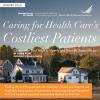



The South Central Pennsylvania alliance and its Patient Partners program were featured on a HEALTHSMART episode on the Chronically Ill. HEALTHSMART is produced by WITF, the central Pennsylvania PBS affiliate.
It is estimated 133 million Americans currently suffer from one chronic disease. Approximately half have multiple chronic diseases. Chronic diseases – long term conditions which can be controlled but not cured – account for 7 of 10 deaths in America. They are considered the leading health concern of our nation encompassing...



One percent of Americans account for 20 percent of the nation’s health care costs; five percent account for 50 percent. Who are these patients? They are known as “super-utilizers”—patients who make frequent trips to the emergency room and have many hospital admissions. Often they are alone and need help determining where to go and how to get healthier.
In six of the Robert Wood Johnson Foundation’s Aligning Forces for Quality (AF4Q) sites, communities are reducing ER visits and hospitalizations for super-utilizers. In her new article, “Caring for...

The Greater Kansas City’s area Aligning Forces for Quality community, led by the Kansas City Quality Improvement Consortium (KCQIC), was named as the first Missouri/Kansas organization to receive recognition as a Community-based Care Transitions Program (CCTP) by the Centers for Medicare and Medicaid. KCQIC and the additional CCTP participants bring the total to 82 community-based organizations providing care transition services to nearly 500,000 beneficiaries in more than 30 states. KCQIC will enter into a two-year agreement. As a part of the efforts, KCQIC will work with local...

The Greater Detroit Area Health Council (GDAHC) was recently recognized for its efforts to connect patients with primary care providers. An article published in Crain’s Detroit Business Review explains that the Detroit Alliance has developed a list of federally qualified health centers, free clinics, and physicians that accept Medicaid for emergency room visitors. The goal is to equip patients with more information to reduce hospital readmissions and prevent frequent emergency room visits.
Sharifa Alcendor, Henry Ford Hospital’s director of strategic community...

Patients often leave the hospital uneducated and confused about how to care properly for themselves at home, ultimately causing them to be readmitted. The 4.4 million potentially preventable trips to the hospital add $30 billion to US healthcare spending each year. The Aligning Forces for Quality initiative in Maine, led by Maine Quality Counts, is addressing the problem of avoidable readmissions, particularly in heart failure patients, by taking steps to help patients get the care they need through a collaborative approach.
Eight Maine hospitals in the Hospital Quality Network...
